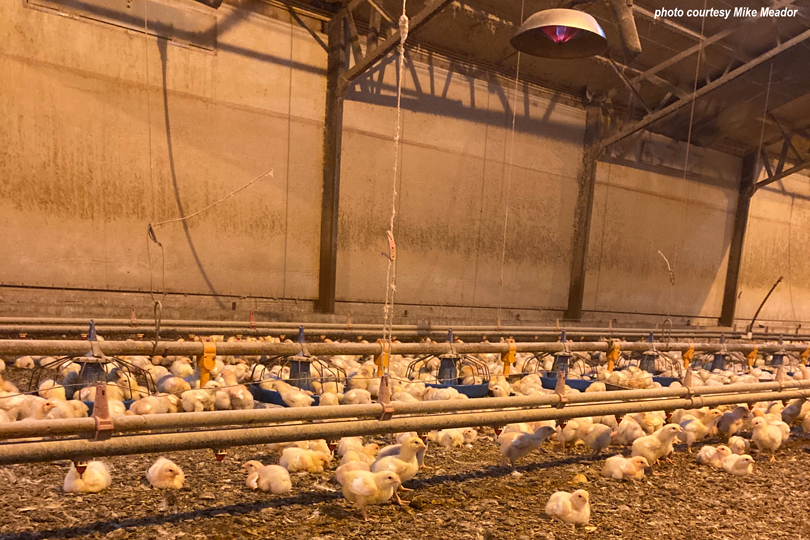By Jennifer Dorsett
Field Editor
Cold weather across the Lone Star State hasn’t missed East Texas poultry farmers. Even contract growers who currently don’t have birds are feeling the effects.
“I’m scheduled to get new birds next week. But my big concern right now is houses collapsing under the weight of the snow and the ice,” Jerry Moody, Titus County Farm Bureau president and poultry farmer, said. “Since I have them scheduled to arrive soon, I have to be sure I keep those houses warm enough that lines don’t break, and we’re watching very carefully to make sure none of the barns are showing any signs of collapsing under the added weight.”
Those who do have birds are facing the added expense of running heaters around the clock, he noted. Propane deliveries are delayed, because the trucks are unable to reach many farms due to the inclement weather and icy road conditions.
But it could be much worse.
In the past, the ongoing rolling electric blackouts would mean going without heat in the chicken houses, a situation that can quickly turn fatal for young chicks. But after a major cold weather event in the early 2000s, Moody said most, if not all, poultry growers now have backup generators to keep heat going in the chicken houses.
During that snowstorm, he and other poultry growers had not yet installed generators, and the cold was much harder on the birds and the farmers.
“Throughout the industry, generators are generally required as a backup now. Back then, we were out of power for seven days, and we did not have generators at that time. We had to go from house to house with a little portable generator, feeding the chickens and just running a few things that we could, and unplug it, and then go to the next house. So, it’s nice to have those generators now,” he said. “But the other issue that you do face with those generators is to hope that the heater blocks are working, and the generators can start up for those guys who have chickens. Anytime you get this cold of weather, that diesel engine is pretty tough to start, and while we do check them from time to time, we’re not used to having to run them.”
Further south in Nacogdoches County, Michael Meador had just received a delivery of newly hatched chicks a day before the cold weather set in.
“I have five-day-old birds. I’m using lots of natural gas at the moment, but it’s going fairly well,” Meador said. “I haven’t had any feed delivery issues because of them being babies and not eating as much yet, so we have enough inventory that I won’t need a truck for probably another week or so. Just getting to and from the houses sometimes has been a problem with all the ice and snow.”
The temperature inside the chicken houses must be kept at 85 to 88 degrees when the chicks are so young. Meador does expect an unusually large natural gas bill for this month, an added expense he won’t get paid more for when the chickens are fully grown. But that’s just the way contract poultry farming works sometimes.
“I’ll likely just have to cut back on something else I might have planned to do as it warms up like improving roads or fences or that sort of thing,” he said.
For him, like the rest of Texans, this is a once-in-a-lifetime event.
“Here in Nacogdoches, most of the time, if we get snow, it snows one day and melts the next,” Meador said. “But this has been a very prolonged episode. My family has been raising chickens since 1966, and I’ve never seen anything like this. And I hope not to ever again.”
Click here to learn more about assistance from the U.S. Department of Agriculture for poultry growers, farmers and ranchers who have experienced losses from the winter storm.


We are also Poulrty growers. One of the problems is getting propane to heat your houses, diesel for your generators. Trucks can’t get to your farm with feed. So if they are out of feed and propane, the chickens at even 3 weeks or 5 weeks have a hard time trying to survive. Then the grower suffers the lost as well. On top of all that the end results are high bills.